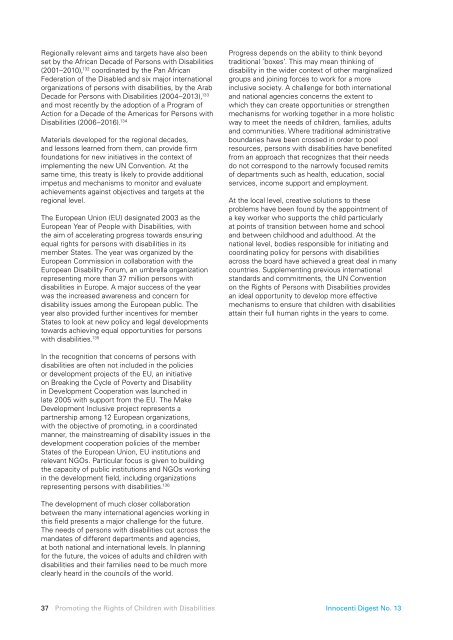Promoting the Rights of Children with Disabilities, UNICEF
Promoting the Rights of Children with Disabilities, UNICEF
Promoting the Rights of Children with Disabilities, UNICEF
- No tags were found...
Create successful ePaper yourself
Turn your PDF publications into a flip-book with our unique Google optimized e-Paper software.
Regionally relevant aims and targets have also beenset by <strong>the</strong> African Decade <strong>of</strong> Persons <strong>with</strong> <strong>Disabilities</strong>(2001–2010), 132 coordinated by <strong>the</strong> Pan AfricanFederation <strong>of</strong> <strong>the</strong> Disabled and six major internationalorganizations <strong>of</strong> persons <strong>with</strong> disabilities, by <strong>the</strong> ArabDecade for Persons <strong>with</strong> <strong>Disabilities</strong> (2004–2013), 133and most recently by <strong>the</strong> adoption <strong>of</strong> a Program <strong>of</strong>Action for a Decade <strong>of</strong> <strong>the</strong> Americas for Persons <strong>with</strong><strong>Disabilities</strong> (2006–2016). 134Materials developed for <strong>the</strong> regional decades,and lessons learned from <strong>the</strong>m, can provide firmfoundations for new initiatives in <strong>the</strong> context <strong>of</strong>implementing <strong>the</strong> new UN Convention. At <strong>the</strong>same time, this treaty is likely to provide additionalimpetus and mechanisms to monitor and evaluateachievements against objectives and targets at <strong>the</strong>regional level.The European Union (EU) designated 2003 as <strong>the</strong>European Year <strong>of</strong> People <strong>with</strong> <strong>Disabilities</strong>, <strong>with</strong><strong>the</strong> aim <strong>of</strong> accelerating progress towards ensuringequal rights for persons <strong>with</strong> disabilities in itsmember States. The year was organized by <strong>the</strong>European Commission in collaboration <strong>with</strong> <strong>the</strong>European Disability Forum, an umbrella organizationrepresenting more than 37 million persons <strong>with</strong>disabilities in Europe. A major success <strong>of</strong> <strong>the</strong> yearwas <strong>the</strong> increased awareness and concern fordisability issues among <strong>the</strong> European public. Theyear also provided fur<strong>the</strong>r incentives for memberStates to look at new policy and legal developmentstowards achieving equal opportunities for persons<strong>with</strong> disabilities. 135Progress depends on <strong>the</strong> ability to think beyondtraditional ’boxes’. This may mean thinking <strong>of</strong>disability in <strong>the</strong> wider context <strong>of</strong> o<strong>the</strong>r marginalizedgroups and joining forces to work for a moreinclusive society. A challenge for both internationaland national agencies concerns <strong>the</strong> extent towhich <strong>the</strong>y can create opportunities or streng<strong>the</strong>nmechanisms for working toge<strong>the</strong>r in a more holisticway to meet <strong>the</strong> needs <strong>of</strong> children, families, adultsand communities. Where traditional administrativeboundaries have been crossed in order to poolresources, persons <strong>with</strong> disabilities have benefitedfrom an approach that recognizes that <strong>the</strong>ir needsdo not correspond to <strong>the</strong> narrowly focused remits<strong>of</strong> departments such as health, education, socialservices, income support and employment.At <strong>the</strong> local level, creative solutions to <strong>the</strong>seproblems have been found by <strong>the</strong> appointment <strong>of</strong>a key worker who supports <strong>the</strong> child particularlyat points <strong>of</strong> transition between home and schooland between childhood and adulthood. At <strong>the</strong>national level, bodies responsible for initiating andcoordinating policy for persons <strong>with</strong> disabilitiesacross <strong>the</strong> board have achieved a great deal in manycountries. Supplementing previous internationalstandards and commitments, <strong>the</strong> UN Conventionon <strong>the</strong> <strong>Rights</strong> <strong>of</strong> Persons <strong>with</strong> <strong>Disabilities</strong> providesan ideal opportunity to develop more effectivemechanisms to ensure that children <strong>with</strong> disabilitiesattain <strong>the</strong>ir full human rights in <strong>the</strong> years to come.In <strong>the</strong> recognition that concerns <strong>of</strong> persons <strong>with</strong>disabilities are <strong>of</strong>ten not included in <strong>the</strong> policiesor development projects <strong>of</strong> <strong>the</strong> EU, an initiativeon Breaking <strong>the</strong> Cycle <strong>of</strong> Poverty and Disabilityin Development Cooperation was launched inlate 2005 <strong>with</strong> support from <strong>the</strong> EU. The MakeDevelopment Inclusive project represents apartnership among 12 European organizations,<strong>with</strong> <strong>the</strong> objective <strong>of</strong> promoting, in a coordinatedmanner, <strong>the</strong> mainstreaming <strong>of</strong> disability issues in <strong>the</strong>development cooperation policies <strong>of</strong> <strong>the</strong> memberStates <strong>of</strong> <strong>the</strong> European Union, EU institutions andrelevant NGOs. Particular focus is given to building<strong>the</strong> capacity <strong>of</strong> public institutions and NGOs workingin <strong>the</strong> development field, including organizationsrepresenting persons <strong>with</strong> disabilities. 136The development <strong>of</strong> much closer collaborationbetween <strong>the</strong> many international agencies working inthis field presents a major challenge for <strong>the</strong> future.The needs <strong>of</strong> persons <strong>with</strong> disabilities cut across <strong>the</strong>mandates <strong>of</strong> different departments and agencies,at both national and international levels. In planningfor <strong>the</strong> future, <strong>the</strong> voices <strong>of</strong> adults and children <strong>with</strong>disabilities and <strong>the</strong>ir families need to be much moreclearly heard in <strong>the</strong> councils <strong>of</strong> <strong>the</strong> world.37 <strong>Promoting</strong> <strong>the</strong> <strong>Rights</strong> <strong>of</strong> <strong>Children</strong> <strong>with</strong> <strong>Disabilities</strong> Innocenti Digest No. 13
















